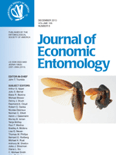
JOURNAL OF ECONOMIC ENTOMOLOGY
Scope & Guideline
Innovating Insights for Agricultural and Ecological Progress
Introduction
Aims and Scopes
- Pest Management Strategies:
Research focusing on integrated pest management (IPM) techniques that combine biological, chemical, and cultural practices to control insect populations effectively. - Insect Resistance Studies:
Investigations into the mechanisms of resistance in insect populations to various pesticides, including genetic, biochemical, and ecological factors. - Impact of Climate Change:
Studies assessing how climate change affects insect behavior, population dynamics, and the efficacy of pest management strategies. - Biological Control Agents:
Research on the use of natural enemies (predators, parasitoids, and pathogens) for the biological control of pest insects. - Ecological Interactions:
Exploration of the interactions between insects and their environment, including host plant relationships and the impact of beneficial organisms. - Economic Analysis of Pest Management:
Evaluations of the economic implications of various pest management strategies, including cost-benefit analyses and assessments of market impacts.
Trending and Emerging
- Sustainable Pest Management Practices:
There is an increasing focus on developing and evaluating sustainable pest management practices that minimize environmental impact and enhance ecosystem health. - Use of Biotechnology in Pest Control:
Research on biotechnological advancements, including genetic engineering and RNA interference, for pest control is gaining traction as a modern alternative to traditional methods. - Impact of Invasive Species:
Studies examining the economic impact and management strategies for invasive insect species are becoming more prominent, reflecting their growing threat to agriculture and ecosystems. - Climate Resilience in Pest Management:
Emerging research is focusing on adapting pest management practices to be more resilient in the face of climate change, including the development of climate-smart agricultural strategies. - Role of Pollinators in Agriculture:
There is a growing emphasis on understanding the role of pollinators in agricultural systems and their interactions with pest management practices, highlighting the importance of pollinator health. - Digital Tools and Precision Agriculture:
The integration of digital tools, such as remote sensing and data analytics, in pest management strategies is on the rise, emphasizing the importance of precision agriculture.
Declining or Waning
- Traditional Chemical Control Methods:
There is a noticeable decline in research focused solely on conventional chemical pesticide applications, as the field shifts towards more integrated and sustainable approaches. - General Biodiversity Assessments:
While still relevant, general studies on biodiversity without a clear link to pest management or economic impact have decreased, reflecting a trend toward more targeted research. - Single-Species Studies:
Research concentrating exclusively on single pest species is waning in favor of studies that consider multi-species interactions and ecosystem-level impacts. - Historical Insecticide Efficacy Studies:
As new pest management strategies and products emerge, studies aimed at assessing the efficacy of older insecticides have become less frequent. - Laboratory-Based Behavioral Studies:
Research focusing solely on laboratory behavioral studies without field application or context is declining in favor of studies that integrate laboratory findings with field conditions.
Similar Journals
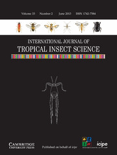
INTERNATIONAL JOURNAL OF TROPICAL INSECT SCIENCE
Uncovering the Secrets of Tropical Insect LifeINTERNATIONAL JOURNAL OF TROPICAL INSECT SCIENCE, published by Springer International Publishing AG, is a leading interdisciplinary journal dedicated to advancing knowledge in the fields of insect science and ecology. With its ISSN 1742-7584 and E-ISSN 1742-7592, this journal provides a platform for researchers to publish high-quality, peer-reviewed articles that explore various aspects of tropical insect biology, behavior, and their ecological impacts. As evidenced by its Q3 ranking in both Ecology, Evolution, Behavior and Systematics and Insect Science, it plays a vital role in fostering scientific dialogue and innovation within these disciplines. Researchers affiliated with the journal benefit from its visibility and growing impact, as demonstrated by its Scopus ranks, with a percentile standing of 61st in Insect Science. Although the journal is not open access, it still reaches a wide academic audience, making significant contributions to our understanding of tropical ecosystems. Situated in Switzerland, this journal is crucial for students, professionals, and researchers invested in the intersection of entomology and ecological science.
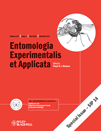
ENTOMOLOGIA EXPERIMENTALIS ET APPLICATA
Exploring the frontiers of entomological knowledge.ENTOMOLOGIA EXPERIMENTALIS ET APPLICATA is a premier journal dedicated to advancing the understanding of insect science through innovative research and thorough experimental methodologies. Published by Wiley, this esteemed journal has been at the forefront of entomology since its inception in 1958, with its latest convergence extending until 2024. With a commendable Impact Factor and categorically positioned in the Q2 quartile across both Ecology, Evolution, Behavior and Systematics and Insect Science fields, it plays a pivotal role in the dissemination of critical findings. The journal is indexed in Scopus, ranking 43rd out of 181 in Insect Science, showcasing its relevance and stature within the academic community, while maintaining a robust visibility among scholars. Given its rigorous peer-review process and a commitment to quality and innovation, ENTOMOLOGIA EXPERIMENTALIS ET APPLICATA serves as a vital resource for researchers, professionals, and students aiming to deepen their insights into entomological research.
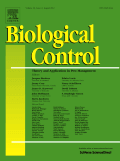
BIOLOGICAL CONTROL
Connecting Scholars to Shape Sustainable AgricultureBIOLOGICAL CONTROL, published by Academic Press Inc Elsevier Science, is a prestigious journal focusing on the advancement of knowledge in the field of biological pest control and integrated pest management. With a high-impact factor reflecting its significant contributions to agronomy and insect science, it has secured elite positions in both Q1 categories as of 2023. The journal ranks within the top 6% and 12% of its fields on Scopus, making it an essential resource for researchers and professionals dedicated to sustainable agricultural practices and ecological balance. With its comprehensive exploration of theoretical and applied studies from 1991 to 2024, BIOLOGICAL CONTROL serves as a critical platform for disseminating innovative research and promoting dialogue among scholars, students, and practitioners. Although the journal follows a subscription-based access model, it consistently attracts contributions that shape the future of pest management strategies.

Frontiers in Insect Science
Bridging the Gap Between Research and Application in Insect ScienceFrontiers in Insect Science is a pioneering open-access journal dedicated to the advancement of knowledge in the field of insect science. Published by FRONTIERS MEDIA SA in Switzerland, this journal serves as a vital platform for researchers, professionals, and students to disseminate high-quality, peer-reviewed research spanning diverse topics within insect biology, ecology, and pest management. Since its establishment in 2021, the journal has gained recognition, ranking in the Q2 category of Insect Science with a Scopus ranking of #92 out of 181 in the field. With a commitment to promoting open access and collaboration, Frontiers in Insect Science is instrumental in fostering innovative research and practical applications essential for combating biodiversity loss and enhancing agricultural sustainability. As a freely accessible resource, it invites contributions that impact both fundamental and applied insect research, connecting a global network of scholars eager to explore the fascinating world of insects.
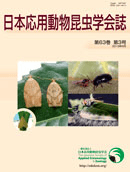
JAPANESE JOURNAL OF APPLIED ENTOMOLOGY AND ZOOLOGY
Innovating for Sustainable Pest ManagementJapanese Journal of Applied Entomology and Zoology is a premier publication in the field of Insect Science, offering a platform for researchers and practitioners to share their findings on applied entomology and zoology. Established in 1957 and published by the Japan Society of Applied Entomology and Zoology, this journal aims to foster the understanding of insect-related studies that impact agriculture, ecology, and biodiversity. With an ISSN of 0021-4914 and E-ISSN of 1347-6068, it serves as a crucial resource for both academics and industry professionals. While the journal currently resides in the Q4 category of the Scopus ranking for Insect Science with a percentile of 11th, it plays a significant role in providing valuable insights into insect behavior, systematics, and their ecological roles. Readers can benefit from its published research to drive innovations and solutions in pest management and conservation practices. As the journal continues to evolve, it reinforces its commitment to disseminating critical research that supports sustainable practices in entomology and zoology through its convergence extending to the year 2024.
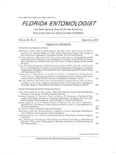
FLORIDA ENTOMOLOGIST
Connecting Minds in the World of Insect BiologyFLORIDA ENTOMOLOGIST is a prestigious peer-reviewed journal dedicated to the advancement of entomological sciences, published by Walter de Gruyter GmbH. Since its transition to open access in 1994, the journal has become a vital resource for researchers, students, and professionals in the fields of Insect Science and Ecology, Evolution, Behavior, and Systematics. With an impact factor ranking high in its category—Q2 in Insect Science and Q3 in Ecology, Evolution, Behavior and Systematics—the journal showcases significant findings and contributions that shape our understanding of insect biology and its implications for ecological systems. The journal is indexed in Scopus, further establishing its relevance, with current rankings reflecting its competitive standing within Agricultural and Biological Sciences. Published continuously since 1982, FLORIDA ENTOMOLOGIST not only facilitates the dissemination of knowledge among entomologists but also encourages interdisciplinary collaboration, making it an essential publication for anyone invested in the scientific study of insects.

PHYTOPROTECTION
Transforming Plant Protection for TomorrowPHYTOPROTECTION is a distinguished academic journal dedicated to the field of plant protection, published by the Quebec Society for the Protection of Plants. With an ISSN of 0031-9511 and an E-ISSN of 1710-1603, it serves as a platform for researchers, professionals, and students focused on the latest advances in plant protection methodologies, pest management, and sustainable agricultural practices. Although the journal's coverage in Scopus has been discontinued since 2010, its past publications encompass a wealth of valuable research from 1993 to 1994 and from 1996 to 2010, making it a crucial resource for those investigating plant health. The journal firmly positions itself as a fundamental contribution to the advancement of agricultural science, emphasizing research that addresses both contemporary challenges and future trends in the protection of plant resources.
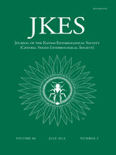
JOURNAL OF THE KANSAS ENTOMOLOGICAL SOCIETY
Bridging Research and Agricultural ImpactJOURNAL OF THE KANSAS ENTOMOLOGICAL SOCIETY, published by the Kansas Entomological Society, serves as a vital platform dedicated to the field of entomology and insect science. With an ISSN of 0022-8567 and an E-ISSN of 1937-2353, this journal has established itself since its inception in 1994, continuing to contribute valuable research up to 2024. Despite its current Q4 categorization in the 2023 Insect Science rankings, it ranks 106 out of 181 in Scopus, representing a significant opportunity for researchers to disseminate their findings in a supportive and engaged community. Although it is not an open-access journal, its commitment to rigorous peer review and relevance in agricultural and biological sciences makes it an essential resource for professionals, scholars, and students alike. The journal's focus on local and regional entomological issues often addresses broader ecological impacts, showcasing the importance of insects in environmental health and agriculture. We invite you to explore the rich tapestry of findings and discussions within this esteemed publication.
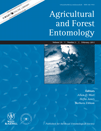
AGRICULTURAL AND FOREST ENTOMOLOGY
Elevating research on insect impacts in agriculture and forestry.AGRICULTURAL AND FOREST ENTOMOLOGY is a leading journal published by Wiley, focusing on the interface of entomology, agriculture, and forestry. With a robust impact reflected in its Q2 and Q1 quartile rankings in prominent categories like Agronomy and Crop Science, Forestry, and Insect Science, this journal serves as a vital platform for researchers and professionals seeking to advance their understanding of insect impacts on agricultural and forest ecosystems. Since its inception in 1999, it has provided a comprehensive collection of high-quality research, facilitating interdisciplinary discussions and innovations in pest management, biodiversity, and sustainable practices. Although it does not currently offer Open Access, the journal continues to uphold rigorous peer-review standards, ensuring that published works maintain a profound scientific value. As of 2023, its Scopus rankings further signify its prominence in the field, engaging a global audience keen on addressing the pressing challenges faced within agricultural and forest sciences.

TURKIYE ENTOMOLOJI DERGISI-TURKISH JOURNAL OF ENTOMOLOGY
Innovating Research in Entomology and EcologyTURKIYE ENTOMOLOJI DERGISI - TURKISH JOURNAL OF ENTOMOLOGY is a distinguished journal published by the Entomological Society of Turkey in collaboration with Ege University, dedicated to advancing the field of insect sciences. With an ISSN of 1010-6960 and E-ISSN 2536-491X, this journal plays a pivotal role in disseminating groundbreaking research in entomology, particularly focusing on the diverse aspects of insect biology, ecology, and their applications in agriculture. As a member of the Q3 category in Insect Science according to the 2023 quartiles, it ranks in the 40th percentile of its field, indicating its growing influence and importance within the scientific community. The journal's scope encompasses innovative research findings, reviews, and short communications that contribute to the understanding and management of insect species. While not currently open access, it serves as a vital resource for researchers, professionals, and students seeking to stay informed about the latest developments in entomology from Turkey and beyond, with a commitment to maintaining high scholarly standards through rigorous peer review processes.